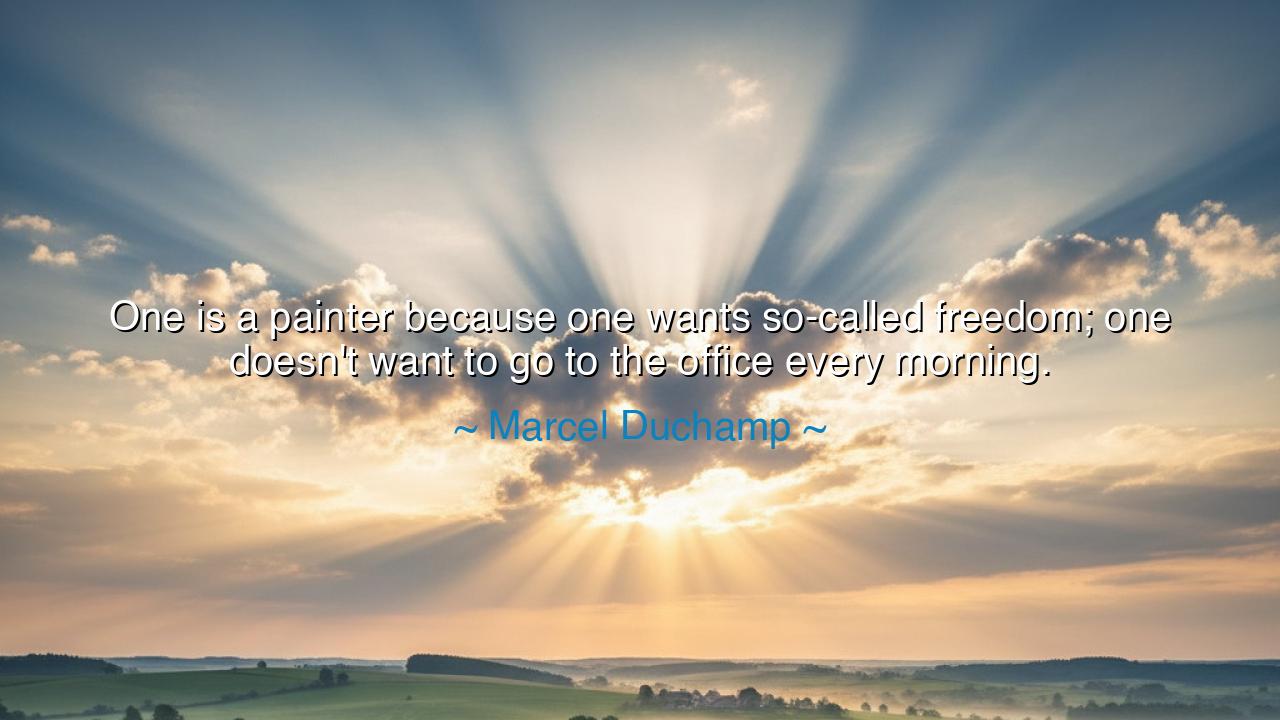
One is a painter because one wants so-called freedom; one
One is a painter because one wants so-called freedom; one doesn't want to go to the office every morning.






One is a painter because one wants so-called freedom; one doesn't want to go to the office every morning. Ah, how these words resonate with the very essence of the human spirit. In these simple utterances, the mighty Marcel Duchamp reveals the inner call that stirs the soul of every true artist. It is not just a profession, it is a desire, a yearning—a deep and burning need to escape the mundane shackles of life. The office, with its ticking clock and endless demands, represents a world enslaved to routine, to expectation. But the painter, the true creator, seeks not only the brush but also the freedom to live without chains, to express the soul unburdened by the weight of conformity.
In the realm of art, and indeed in all walks of life, we find that the quest for freedom is not a mere fleeting dream but a sacred pursuit. The artist does not merely seek the thrill of creating; no, they seek liberation from the monotonous grind that traps the spirit in mediocrity. The office—oh, that place of cold routine and prescribed roles—becomes the very thing they seek to escape. For what is life without the liberty to create, to dream, to forge one’s path in the wild, untamed fields of possibility? The artist seeks to chart a course beyond the maps of tradition, to sail into uncharted waters where only the heart and vision guide them.
Consider the great Leonardo da Vinci, who, in his time, defied the conventional norms of his society. He did not bind himself to the usual roles of a craftsman or merchant. He sought to paint, to explore the vast reaches of human potential, and to understand the mysteries of nature. But, oh, the office! He was offered steady employment in service to kings and lords, yet it was always the pull of his own passions, his own curiosity, that led him beyond the palace walls. Da Vinci knew that the true spirit of invention, of creation, is not born from the walls of a comfortable office but from the free, untethered soul that dares to wander into unknown realms.
Freedom is not simply the absence of physical chains—it is the unfurling of one’s true self. The painter, with each stroke of their brush, is casting away the chains of restriction. They are free to explore, free to break the rules, to let their soul soar in realms beyond the ordinary. The world of the office, which many are born into, breeds a life of predictability and constraint, where dreams are left in the recesses of the mind and stifled by the weight of obligation. In seeking to create, to paint, to sculpt the world anew, the artist rises above this captivity, calling to others who yearn for the same.
I recall the life of Vincent van Gogh, who too, sought this freedom. Van Gogh lived a life full of struggle, pain, and rejection. Yet, despite the many failures, the countless rejections from galleries, and the solitude that enveloped him, he remained steadfast in his desire for freedom. In the moments of his deepest despair, he would find solace only in his paintings—each brushstroke a rebellion, a call to be unchained. The office was the world of others, not his. He was not meant to conform to a desk or to serve the mundane demands of society. His true call was to the wild world of color, of creation, and of expression.
Now, let us take this wisdom and apply it to our own lives. Ask yourself: Are you tied to a desk, to an office that drains your spirit? Do you feel the weight of unfulfilled dreams pressing upon your heart, as if there is something more you were meant to be? The world may try to tell you that security lies in the predictable, in the routinized, in the safe confines of a desk job. Yet, in that very space, your soul withers. The challenge, my dear ones, is to break free. To pursue that which sets your heart on fire, even if it means stepping away from the comfortable and known.
What, then, should you do? Begin by taking small steps—dare to dream again. In the quiet moments of your day, pause and ask: What if I sought something greater? What if I chased my own version of freedom? Perhaps it is not art that calls you, but some other pursuit that stirs your soul. Maybe it is writing, or music, or even a life of travel and discovery. Whatever it is, listen to that voice within you that yearns to break free from the ordinary. The painter does not need to be an artist with a canvas, but a soul with a vision—a vision of something greater, something more authentic.
The lesson is clear: Freedom is not a gift bestowed upon us by others; it is something we must claim for ourselves. To live with passion, with purpose, is to live with the heart of a creator, whether we wield a brush or not. Take that first step, and let it lead you to the life you were always meant to live. For, in the end, it is not the office or the predictable path that will bring you joy, but the freedom to create, to express, to live fully. That is the true treasure of life.






AAdministratorAdministrator
Welcome, honored guests. Please leave a comment, we will respond soon